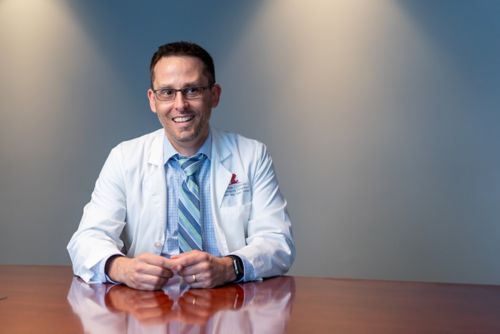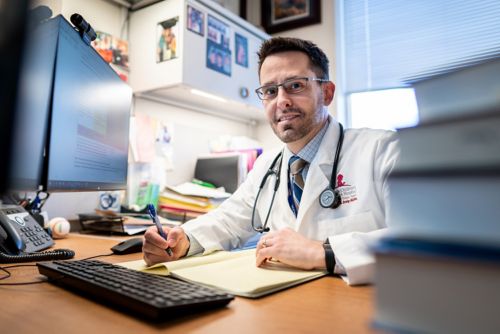St. Jude Family of Websites
Explore our cutting edge research, world-class patient care, career opportunities and more.
St. Jude Children's Research Hospital Home

- Fundraising
St. Jude Family of Websites
Explore our cutting edge research, world-class patient care, career opportunities and more.
St. Jude Children's Research Hospital Home

- Fundraising
Matthew J. Ehrhardt, MD, MS
Treating children with Hodgkin and non-Hodgkin lymphomas and studying the late effects of cancer treatments
Overview
Survivors of pediatric cancer have unique needs as there are certain treatment-related late effects that can arise with age. My work identifies associations between cancer treatments and long-term health problems and defines what appropriate follow-up care looks like for survivors. I am also interested in implementing appropriate screening guidelines to enable the possibility of preventative care in high-risk survivors.

Research Summary
Over the past several decades, the number of pediatric cancer survivors has risen drastically. The overall survival rate of children with cancer is now approximately 85%, meaning that there are now more childhood survivors of cancer than ever before. It is well known that treatment-related side effects occur in some survivors as they age, which highlights the importance of identifying the risks associated with pediatric cancer treatments.
Understanding the impact of cancer treatments
Three out of every five long-term pediatric cancer survivors report treatment-related “late effects” as they age. Clinicians have long observed the presence of a variety of health and learning issues associated with certain cancer treatments. In some cases, these lead to significant medical problems, decreased lifespan and impact quality of life.
Identifying treatment-related late effects
My work has improved our understanding of how cancer and its treatments impact, among many things, heart health. Compared to the non-cancer population, survivors have a four-fold increased risk of acquiring cardiac conditions and, subsequently, succumbing to those conditions.
I recently identified two biomarkers that predict those at high risk for developing cardiomyopathy even though they may be clinically asymptomatic. This finding improves our ability to identify those who may go on to develop cardiac problems and, therefore, those that stand to benefit most from early intervention. In addition, my research has contributed to the elimination of cardiac screening recommendations from survivorship guidelines for survivors at lowest risk of cardiomyopathy, sparing these individuals costly and time-consuming evaluations.
Development of long-term care guidelines
I Co-Chair the development of the Children’s Oncology Group Long-Term Follow-Up Guidelines for Survivors of Childhood, Adolescent and Young Adult Cancers. This resource provides key information to healthcare providers so that they can appropriately screen for and manage the overall health of survivors as they age. This information is kept up-to-date based on novel findings in the literature, and we are invested in improving the dissemination and implementation of these guidelines. Along these lines, I am leading the development of resource-adapted survivorship guidelines to provide relevant recommendations for surveillance in a more global capacity.
I also work with the International Late Effects of Childhood Cancer Guideline Harmonization Group (IGHG), an organization that collaborates with several guideline groups to unify the way we approach guideline development. Here, I provide valuable insight into the risks of certain cancer treatments on long-term cardiac health.
Clinical impact
My research into cancer survivorship was originally nested within the lymphoma space as I specialize in the treatment of pediatric Hodgkin and non-Hodgkin lymphomas. I am currently opening and leading cooperative group clinical trials to advance novel treatment strategies for these cancers.
Selected Publications
About Dr. Ehrhardt
Dr. Ehrhardt received his MD from the University of Illinois College of Medicine and his MS in Clinical and Translational Science from the Medical College of Wisconsin. He completed an internship and residency in Internal Medicine and Pediatrics at the Medical College of Wisconsin as well as a fellowship in Pediatric Hematology/Oncology in Blood and Marrow Transplantation. Dr. Ehrhardt came to St. Jude Children’s Research Hospital in 2014 for a fellowship in the Division of Cancer Survivorship within the Department of Oncology. He is now an Associate Member of the St. Jude faculty in this department with a secondary appointment in the Department of Epidemiology and Cancer Control.
Dr. Ehrhardt’s clinical focus centers on the treatment of children with Hodgkin and non-Hodgkin lymphomas while his research is focused on understanding late effects of treatment on long-term survivors. Further, he helps standardize and optimize follow-up screening and care for survivors with the Children’s Oncology Group and IGHG. He is also a key contributor to the Implementation Science Collaborative at St. Jude.

Contact us
Matthew J. Ehrhardt, MD, MS
Associate Member
Department of Oncology
Division of Cancer Survivorship
Department of Epidemiology and Cancer Control
MS 735, Room S6033
St. Jude Children's Research Hospital

Memphis, TN, 38105-3678 USA GET DIRECTIONS
